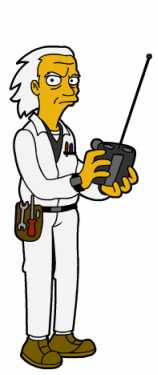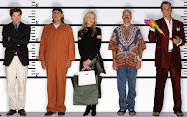I've seen a lot of movies in the last two weeks, and instead of doing individual reviews of them (especially since they're a bit late), I'm only going to write a few words on them. In short, the only movie worth seeing again is
17 Again.
 Wolverine:
Wolverine: For science-fiction fans, origins stories are always a highlight. In most sci-fi narratives, the story begins in the middle (as with the
Star Wars trilogy) or at the end (as with most post-apocalyptic tales, such as
I Am Legend). Starting in the middle creates intrigue about the character and how they got to this point, and Wolverine is one of the most interesting characters of the
X-Men universe. So I'm absolutely flabbergasted that no one even tried to make this into a good movie. Every step along the way, there was some producer going, "This doesn't need to be good; we've got Hugh Jackman!" (1) Wolverine's awesome name, which refers to his primal and animalistic qualities, was appropriated from his girlfriend's Native American story about a jealous moon? What? Seriously? (2) We see Wolverine's original claws, which were rounded and made of bone. It makes absolutely no sense then, that adding adamantium to his skeletal structure would sharpen the blades into sharp killer knives. (3) The good/bad duality was so transparent, obvious, and no additional element was added to it to make it interesting. Wolverine's good; his brother's bad. (4) The action scenes didn't even try to be realistic. One particular shot had Action-Jackman walking away from an explosion, and I swear the shot was created circa 1978. Jackman's face and bad hair fill the frame as fire explodes behind him. Another scene has Ryan Reynolds splitting a bullet with his sword -- I repeat,
splitting a bullet with his sword -- and the fractured bullets end up killing two guards behind him. Ridiculous. (5) Speaking of Ryan Reynolds, I don't recall the name "Deadpool" ever being uttered, but the ending of the film sets him up for a sequel. Really, Hollywood? Was this sequel created with the sole intent on formulating another sequel? (6) Overall, it was an entertaining film and, since I saw it as a double-feature and paid only $4.75 for the show, I was able to ignore that two hours of my life were stolen from me. But it's not a good movie. It's not a good story. The relationship aspects (whether with Wolverine's brother or his girlfriend) were poorly constructed. The best part of the film was the opening credits (though nothing will ever top the
Watchmen credits), and after that, it lacks creativity (even the big show-down at the end of the film is a mash-up of previous action movies) and never takes off. As far as action films go (and let's be honest, they have different criteria of quality than other genres), I'd give it a
C/C+.
Observe and Report: I really didn't get this movie at all. It's a satire that didn't seem to know it was a satire. Seth Rogen plays a mall cop infatuated with Anna Faris's character (I've only ever seen her play one type of character, and I despise the character every time), and he believes that catching the mall flasher will somehow win her heart. Except... he takes her one of the most disgusting dates I've ever seen half-way through the movie, and he doesn't exactly grow by the end of it. The whole point of watching a movie about a useless bum is that eventually he turns his life around or grows up or learns something. And he doesn't. Also -- spoiler alert -- he shoots the flasher. He doesn't catch him; he shoots him. (And really, this is the only scene that suggests the movie's an absurdist satire.) The worst part of the movie, though, was Michael Peña as an offensively stereotypical portrayal of a sexually-ambiguous Mexican with a lisp. There were parts of the movie that were funny, but overall, I look back on the experience and think... what was the point of any of it? Other than sucking my brain out through my eyeballs. I do not recommend this movie to anyone (seriously, who was their target demographic with this?), and I'd give it a
D-.
 Duplicity:
Duplicity: This movie was 90% exposition and 10% Clive Owen looking really good in suits. (And when I think back on the film, there's only 10% of it I care to remember...) In short, Julia Roberts and Clive Owen's characters team up as romantic partners to con two competing corporations for the "ultimate con job." They are CIA agents working for Paul Giamatti's company (and he is completely wasted in this role), with Roberts' character infiltrating his rival's company to compete for -- wait for it -- a hair growth serum. (This was a very disappointing payoff to the biggest build-up in the movie, and I kept hoping for something more monumental to be at the center of everyone's deception. A hair growth serum? Really?) The reason why this movie was so bad is because it was redundant in its execution (exposition voiceovers over a montage of the plan being set into motion), had way too many flashbacks (all to previous romantic encounters of Roberts and Owen's relationship -- which, really, was a false setup for the nature of their relationship), and how often everyone schemes someone else. I like caper films, I do, but they only work when there is one common goal between the main characters. That's why the convoluted plot of
Ocean's 11 worked, despite there being such a large cast. Throughout the movie, Roberts and Owen's characters constantly deceive and question one another, and the movie tells me that it's in their nature to do so and, furthermore, this makes them ideal partners in a romance. Umm, no. I understand that the writers were setting up a world where nothing is as it seems and no one can be trusted -- and the audience, therefore, cannot predict the ending -- but it became too much plot and not enough character development. And I won't give away the ending, but... it was suitable, both within the narrative itself (nobody wins!) and also the execution. That's right. The ending of the movie is a flashback montage with a voiceover explaining how everything lead up to the ending. I was bored out of my mind during the movie, but I can understand how other people might enjoy. It wasn't God-awful and I would only recommend it to a select handful of people, but I would never spend my time watching this movie again. I'd give it a
C+.
 Ghosts of Girlfriends Past:
Ghosts of Girlfriends Past: If you've read more than ten posts on this blog or you've ever met me in real life, you know two things almost immediately. I loathe romantic comedies (except for
French Kiss), and Nicolas Cage is the
worst actor of all time. So why would I voluntarily go see a movie that is
so formulaic and saturated in verbal foreplay that even the trailer makes me retch? Because I'm a cinephile, that's why. Because most movies I see are crap, and whether I go into it knowing that or discover it while I'm watching it really makes no difference. Based off of Charles Dickens'
A Christmas Carol (one of my favorite narratives ever told),
Ghosts follows Connor Mead, a douchebag with a douchebag name and a douchebag job, on a journey to become less of a douchebag. (Matthew McConaughey was perfectly cast, by the way.) Jennifer Garner's talents are wasted as the "girl who got away (but not so far that she won't forgive ten years of pain for one apology)." The biggest problem with this movie is that Matthew McConaughey doesn't know how to
not be a douchebag, so there's no physical, verbal, or emotional growth at the end of the movie. There's just what's in the script. He's the exact same character he was at the beginning of the movie. All of the jokes are tired, and you know exactly how the movie ends. And this could have been fixed -- as much as a romantic comedy could -- by adding another conflict of interest. Connor Mead is the best man in his brother's wedding, and having slept with all of the bridesmaids, he's the most popular guy at the wedding. Even though the women despise his misogynistic ways, they still want to bed him. (There is a scene earlier in the film that mocks this notion, with a young artist telling Connor to use and dispose of her, but it was too realistic for the mocking tone to really pull through. The scene was just sad and offensive, then.) The only real problem that Connor Mead has -- like Ebeneezer Scrooge -- is himself. That leads to a very unfulfilling story, especially when the protagonist (and I use that word in its most basic form) never really changes. Sure, Garner's character is given a love interest (who is surprisingly okay with the fact he was flown in specifically for wedding sex), but they have such little screen time together that he never becomes a real conflict for our two lovebirds. And as with all romantic comedies -- you knew this part was coming, right? -- I was offended by the representation and reduction of women to sex-crazed idiots (who never seem to know how to hold their liquor). Garner's the only character to escape this representation, of course, because romantic comedies push for "authentic women" to be sexy, when really, every woman watching wants to be the other two-hundred sluts represented in the movie. As with
Wolverine, I really don't think anyone was even trying to make a good movie. I'd give it an
F. That's right.
An F. What Michael Douglas was doing in this film is beyond me.
 17 Again:
17 Again: I saw this as a double-feature, being the second film after
Ghosts of Girlfriends Past, and out of all of the movies I've seen recently, I enjoyed this one the most. Perhaps it's because I have an unabashed crush on Zac Efron (he's just so pretty), or perhaps it's because any movie following
Ghosts would look like
Citizen Kane, but this movie has a lot to recommend it. But first,
the bad: (1) What's more unbelievable, that Matthew Perry would be transformed into his former 17-year-old self, or that Zac Efron would grow up to look like Matthew Perry? Yeah... (2) There was a lot of creepiness floating around regarding romance. I remember watching the trailer and thinking Efron's character, Mike O'Donnell, shouldn't be protecting his daughter from a slimey boyfriend because she'll mistaken his concern for romantic affection, and... yep, that's what happens. His daughter tries to seduce him -- as a lioness, no less. Also, he hits on his ex-wife (Leslie Mann, who's remarkable in everything) in practically every scene they're in, and it's often uncomfortable to watch, even as an outsider who knows what the real situation is. (3) The age-reversal comes too early in the movie, and they don't explain why/how it happens. There's a random "spirit guide" who allows him this transformation without so much of a reason why. At least in
Pleasantville, Don Knox explained why he made the switch. But once you get past, you know, the plot, the rest of the movie is smooth sailing. Now for
the good: (1)
Thomas Lennon (of
Reno 911) steals every scene he's in as Mike's geeky best friend. He's obsessed with wooing the principal (played by
The Office's Melora Hardin), and he wins her over with
Lord of the Rings references and Elfish. (2) Zac Efron was able to project a "fatherly tone" quite well when he was in "father" mode around his children. He's a little
too good at basketball (one scene finds him dribbling circles around his daughter's boyfriend, and the scene sticks out from the rest of the movie), but I knew there were going to be random moments displaying Efron's awesomeness going into the movie. (3) Leslie Mann is a landscaper, and the backyard she creates is AMAZING. Okay, so that has less to do with the movie more with my love of HGTV, but it's still something I enjoyed. And (5) This isn't really spoiling anything because most age-reversal movies have "the moment of honesty" (where the transformed protagonist tells his love interest the truth in a very vague way), but this film, I think, has the best moment I've seen in this genre.

"I want to remind you of September 7th, 1988. It was the first time that I saw you. You were reading Less Than Zero, and you were wearing a Guns 'n' Roses t-shirt. I'd never seen anything so perfect. I remember thinking that I had to have you or I'd die... then you whispered that you loved me at the homecoming dance, and I felt so peaceful... and safe... because I knew that no matter what happened, from that day on, nothing can ever be that bad... because I had you. And then I, uh... I grew up and I lost my way. And I blamed you for my failures."
Showing up for his divorce court date as his 17-year-old self, Efron reads a letter to his wife. Efron's delivery of the above words is surprisingly very moving, and the only reason I didn't get teary-eyed is because I was so mesmerized at the notion that Zac Efron can actually act. And of course, his soon-to-be ex-wife finds the letter later and discovers that there was no letter at all. It was a piece of paper with directions to the courthouse. I have to admit, I was very happy with this development. And lastly, (6) most movies, and in particular this genre, like to bash us over the head with a moral reveal. In
Big, it was the idea that youth is fleeting and you should enjoy it while you can. Growing up and becoming an adult will eat your soul. (Or something like that.) In
13 Going on 30, it was the idea that being popular is not as important as being true to who you are. If you compromise yourself or your judgments, you will lose out on true happiness (with Mark Ruffalo). And while
17 Again has one of these morals, it's the best one I've seen from this genre. Now
this I won't spoil because it's just too good, and because this is the only film on the list I'm actually recommending. I'd give this movie a
B (with a smile).















































.jpg)

